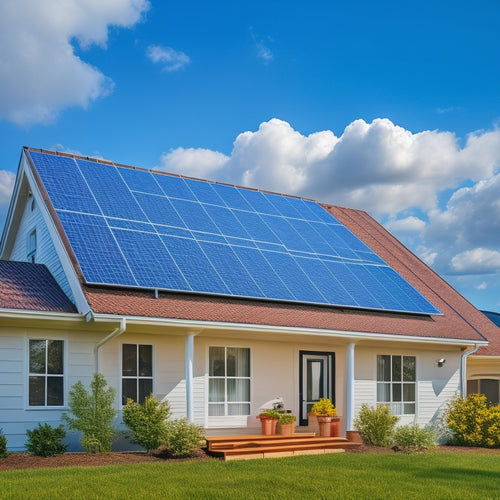
Best Solar Batteries for Home Energy Independence
Share
You're investing in solar energy to break free from the grid, and the right battery is essential to achieving true home energy independence. Lithium-ion batteries offer high energy density, long lifespan, and high depth of discharge, making them a popular choice. Lead-acid batteries are cost-effective but have shorter lifespans and lower depth of discharge. Consider your energy needs, solar panel output, and budget when selecting a battery. Efficiency ratings, integration with existing systems, and maintenance needs are also significant factors. By understanding these aspects, you'll be well on your way to finding the best solar battery for your home energy independence goals, and exploring further will reveal even more customized solutions.
Key Takeaways
- Lithium-ion batteries offer high energy density, long lifespan, and high discharge rates, making them a popular choice for home energy independence.
- Battery capacity should be sized to meet peak demand, considering solar panel output and average daily energy consumption to ensure optimal energy storage.
- High-efficiency batteries with round-trip efficiency above 90% can maximize energy savings and return on investment, while regular maintenance sustains efficiency over time.
- Compatibility with existing systems, including solar panels and inverters, is crucial for safe operation, and integration with smart home systems enables remote monitoring and management.
- When selecting a solar battery, consider factors such as cost, lifespan, and performance features like built-in safety features, round-trip efficiency, and depth of discharge.
Top Rated Solar Batteries
As you commence on your expedition to energy independence, selecting the right solar battery is essential to guaranteeing a reliable and efficient home energy system.
You'll want to contemplate top-rated solar batteries that offer a long battery lifespan, typically between 10 to 15 years, to minimize replacement costs. A cost comparison of different solar batteries will also help you make an informed decision.
Look for batteries with a high depth of discharge (DOD), as they can provide more usable energy. Additionally, contemplate batteries with built-in safety features, such as overcharge protection and thermal management, to guarantee safe operation.
Deep Cycle Battery Options
While you're evaluating top-rated solar batteries, deep cycle battery options deserve special attention. These batteries are designed to provide a steady flow of energy over a long period, making them ideal for home energy independence.
Here are 4 key factors to weigh when selecting a deep cycle battery:
-
Battery Lifespan: Look for batteries with a lifespan of 10-15 years or more to minimize replacement costs.
-
Charge Cycles: Deep cycle batteries can handle 300-500 charge cycles, making them suitable for daily use.
-
Depth of Discharge (DOD): A higher DOD means you can use more of the battery's capacity, but it may reduce its lifespan.
- Round-Trip Efficiency: This measures the battery's ability to store and release energy efficiently, with higher efficiencies indicating less energy loss.
Lithium-Ion Battery Benefits
Lithium-ion batteries stand out from other deep cycle battery options due to their impressive performance and unique benefits.
You'll appreciate their high energy density, which means they pack more power per unit of weight and volume. This translates to a more compact design, ideal for homes with limited space.
Lithium-ion batteries also boast exceptional lithium ion longevity, with a lifespan of up to 10 years or more, depending on usage and maintenance.
While the initial lithium ion cost may be higher, their longer lifespan and lower maintenance needs make them a cost-effective option in the long run.
Additionally, lithium-ion batteries are highly efficient, with a discharge rate of up to 90%, ensuring you get the most out of your stored energy.
Lead-Acid Battery Alternatives
You're likely considering lead-acid battery alternatives because you want more efficient and reliable energy storage solutions.
When exploring deep cycle options, you'll find that energy density matters, as it directly impacts the battery's overall performance and lifespan.
As you weigh your options, you'll uncover that lithium-ion batteries offer distinct advantages over traditional lead-acid batteries, making them an attractive choice for home energy independence.
Deep Cycle Options
Deep in the heart of your off-grid energy system, a reliable deep cycle battery is essential for storing excess energy generated by your solar panels.
When it comes to Lead-Acid Battery Alternatives, you have several options to take into account.
Here are some key benefits of deep cycle batteries:
-
Longer solar battery lifespan: Deep cycle batteries can last up to 15 years, with a minimum of 5,000 charging cycles.
-
Deeper discharge capability: They can be discharged up to 80% without damaging the battery, allowing you to store more energy.
-
Improved efficiency: Deep cycle batteries have a higher round-trip efficiency, meaning they can store and release energy more effectively.
- Enhanced safety features: Many deep cycle batteries come equipped with built-in safety features, such as thermal management and electrical protection, to guarantee safe operation.
Energy Density Matters
Three key factors determine the overall performance of a battery: power, lifespan, and energy density.
When it comes to energy storage, you need a battery that can pack a punch without taking up too much space. That's where energy density comes in – it's the amount of energy stored per unit of weight or volume.
You'll find that lead-acid batteries, while reliable, often fall short in this department. They're heavy, bulky, and can't store as much energy as their alternative counterparts.
This means you'll need more lead-acid batteries to achieve the same energy storage capacity, taking up essential space and potentially affecting your battery lifespan.
Lithium-Ion Advantages
As I weigh the options for energy storage, I find myself drawn to lithium-ion batteries, which offer an attractive alternative to lead-acid batteries.
Lithium-ion batteries boast a longer lifespan, with some models lasting up to 15 years or more, compared to lead-acid batteries which typically last around 5-7 years.
Here are some key advantages of lithium-ion batteries:
-
Longer lifespan: Lithium-ion batteries have a longer lifespan, reducing the need for frequent replacements.
-
Improved safety: Lithium-ion batteries have a lower risk of thermal runaway, making them a safer choice for home energy storage.
-
Higher efficiency: Lithium-ion batteries have higher charge and discharge efficiency rates, resulting in more usable energy.
- Lighter and more compact: Lithium-ion batteries are generally lighter and more compact, making them easier to install and maintain.
Best Battery Capacity Options
By the time you've decided on a solar panel system, you're likely thinking about how to store the excess energy it generates. Choosing the right battery capacity is vital to guarantee you can power your home during the night or on cloudy days.
A capacity efficiency analysis is essential to determine the ideal battery size for your system. You'll want to take into account your energy usage patterns, the size of your solar panel system, and the battery's depth of discharge (DOD). A higher DOD means you can use more of the battery's capacity before recharging.
When comparing different battery options, look for a battery lifespan comparison to confirm you're getting the best value for your investment. Aim for a battery with a high capacity and long lifespan to maximize your energy independence.
Solar Battery Maintenance Tips
You've selected the ideal solar battery capacity for your system, but now it's time to verify it lasts as long as possible. Proper maintenance is essential to extending your solar battery lifespan and guaranteeing optimal solar battery efficiency.
To keep your solar battery in top condition, follow these essential tips:
-
Monitor temperature: Confirm your solar battery operates within the recommended temperature range to prevent overheating or cooling issues.
-
Check voltage: Regularly verify your solar battery's state of charge to prevent overcharging or undercharging.
-
Update software: Regularly update your solar battery's software to ensure you have the latest features and performance enhancements.
- Perform routine inspections: Schedule regular inspections to identify any potential issues before they affect your solar battery's performance.
Battery Compatibility Considerations
How seamlessly will your solar battery integrate with your existing system? Compatibility is vital to guarantee safe and efficient operation.
You'll need to take into account battery sizing to guarantee it's compatible with your solar panel array and inverter. Oversizing or undersizing can lead to reduced performance, safety issues, or even system failure.
Inverter compatibility is also essential, as it must be able to communicate with your battery and manage charging and discharging. Look for batteries with built-in inverters or those that are compatible with popular inverter brands.
Additionally, check the battery's communication protocols, such as Modbus or CANbus, to guarantee seamless integration with your existing system.
Frequently Asked Questions
Can I Use a Solar Battery With a Generator for Backup Power?
When sailing through rough waters, you need a reliable anchor and a sturdy sail; similarly, you can pair a solar battery with a generator for backup power, guaranteeing a seamless shift during outages, as long as you verify generator compatibility to reap the solar battery benefits.
How Do I Properly Dispose of Old Solar Batteries?
When disposing of old solar batteries, you'll want to follow safety guidelines to prevent environmental harm and personal injury. Research local recycling options, and make certain you handle batteries with care, wearing protective gear and avoiding short circuits.
Are Solar Batteries Compatible With Wind Power Systems?
When integrating wind power, you'll find that solar batteries are compatible, but require careful system design to guarantee seamless solar battery compatibility and wind power integration, assuring a safe and efficient hybrid renewable energy system.
Can I Install Solar Batteries in an Existing Home?
As you venture into solar battery installation, you'll find that seamlessly synchronizing systems is a sensible step. Yes, you can install solar batteries in your existing home, guaranteeing safe and efficient home energy storage, but it's vital to consult a certified electrician to secure a smooth changeover.
Do Solar Batteries Work During a Power Grid Outage?
When a power outage hits, you'll be glad to know that solar batteries can provide backup energy storage, allowing you to tap into stored electricity and keep your essential appliances running, as long as you've got a properly configured system.
Related Posts
-

Is This the Future of Alternative Energy Systems
Yes, alternative energy systems are shaping the future of energy. Innovations in solar and wind technologies are driv...
-

Cost of Solar Panel Installation
You can expect to pay between $15,000 and $30,000 or more for a typical solar panel installation, depending on the sy...
-

Applications of Photovoltaic Systems
Photovoltaic systems are versatile, converting sunlight into electricity for various applications. You can use them i...


